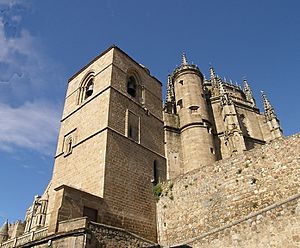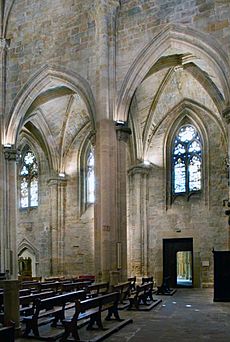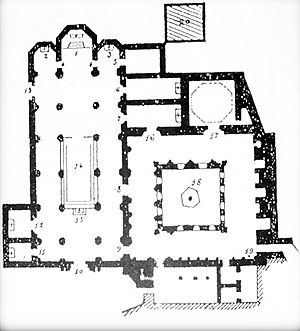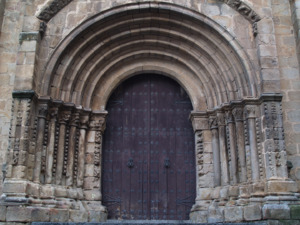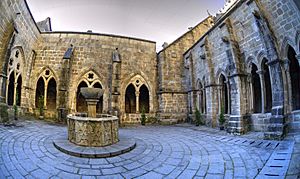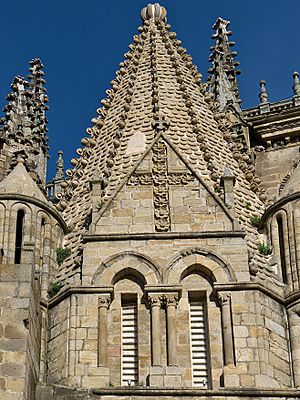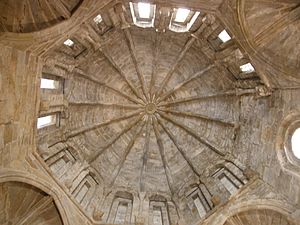Old Cathedral of Plasencia facts for kids
Quick facts for kids Old Cathedral of Plasencia |
|
|---|---|
|
Catedral vieja de Plasencia
|
|
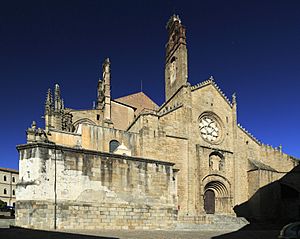
Façade of the cathedral
|
|
| 40°01′41″N 6°05′28″W / 40.02793°N 6.09112°W | |
| Location | Plasencia, Spain |
| Denomination | Roman Catholic Church |
| Architecture | |
| Heritage designation | Bien de Interés Cultural |
| Style | Romantic, Gothic |
| Years built | 13th–15th centuries |
| Administration | |
| Diocese | Roman Catholic Diocese of Plasencia |
The Old Cathedral of Plasencia is a beautiful old Catholic church in Plasencia, Spain. It is one of two cathedrals in the city. The other is the New Cathedral.
Many people call it the Plasencia Cathedral Museum. This building is special because it shows how architecture changed over time. It mixes styles from the Romanesque period and the Gothic period. It is a very famous landmark in Plasencia.
Building the cathedral started in the early 1200s. The last parts, in an early Gothic style, were added in the 1400s. Important architects like Juan Francés helped build it. Today, it is a protected building because of its historical importance.
Contents
History of the Old Cathedral
The Old Cathedral of Plasencia is a great example of how building styles changed. It has parts that look Romanesque and parts that look Gothic. You can see Romanesque ideas in the columns. The Gothic style appears in the arches and windows.
For a long time, the main parts of the church were hidden. A thick layer of lime covered them in the 1700s. After this layer wore away, people could see the cathedral's tall and impressive design.
The cathedral was built in three main steps. In the second step, during the 1300s, the church, its bell tower, and parts of the cloister were finished.
The third and final step happened in the 1400s. During this time, the main chapel was changed. The rest of the cloister was also completed. However, there were problems with the building's foundation. This caused part of the western entrance to fall down. Because of this, the church needed repairs. New burial chapels were also added inside. The last main builders were Juan Martín and Bishop Pedro Jiménez.
In 1931, the cathedral was officially named a "Historical-Artistic Monument." This means it is a very important part of Spain's history and art.
Today, part of the cathedral is the Cathedral Museum of Plasencia. Here, you can see many old paintings and sculptures. These artworks are by famous Spanish and Flemish artists. The museum also displays religious items from the 1400s to the 1600s.
Exploring the Building
The parts of the building that are still standing show its Romanesque beginnings. Some parts even look like an early Gothic style. Originally, it had three main sections with a large central area and two smaller ones. Now, it has three sections without those extra areas. The middle section has its original ribbed ceilings. The side sections have simpler ceilings.
The original back wall had the main chapel. Two smaller chapels were on each side of it. One was for the crucifix, and the other was called Our Lady of Forgiveness. The statues from these chapels have been moved to other parts of the church. Today, a statue of the young Virgin Mary is honored in the central chapel.
Main Entrance
The main entrance is a great example of Romanesque design. It has rounded arches with decorative carvings. Above these arches, there is a stone sculpture showing the Annunciation. This is when an angel tells the Virgin Mary she will have a baby. The Virgin Mary is also shown in a small image on the round window above the entrance.
The Cloister
The cloister is a courtyard surrounded by covered walkways. It has an unusual shape. It shows the change from Romanesque to Gothic styles, which was common in medieval cathedrals. The columns and their tops have carvings of Bible stories, which is a Romanesque feature. But the arches and ribbed ceilings look Gothic. The western and southern walkways are built in the Cistercian style.
In the middle of the courtyard, there is a Gothic fountain from the 1400s. It has the family symbols of Bishop and Cardinal Juan de Carvajal.
Chapel of San Pablo or Melon Tower
The most famous part of the Old Cathedral is the Chapter House. It is also known as the Chapel of San Pablo. People often call it the Torre del Melón (Melon Tower) because of the round, grooved shape at its very top.
The Chapel of San Pablo is similar to other "lantern towers" found in old cathedrals in Spain and Portugal. Its design comes from French Romanesque architecture. The dome of the Plasencia tower was likely finished around 1270. It was probably built by a master stonemason named Gil de Císlar.
The chapter house is a square room that changes into an eight-sided shape at the top. It has a double-layered, cone-shaped dome on the outside. This dome is covered with scale-like layers to protect it from rain. The very top has the famous fluted sphere, which gives the tower its popular name.
Over time, the chapter house has been used for different things. In 1508, it held a library. In 1544, it became the main chapel while other parts of the cathedral were being changed.
See also
 In Spanish: Catedral vieja de Plasencia para niños
In Spanish: Catedral vieja de Plasencia para niños
 | James B. Knighten |
 | Azellia White |
 | Willa Brown |


